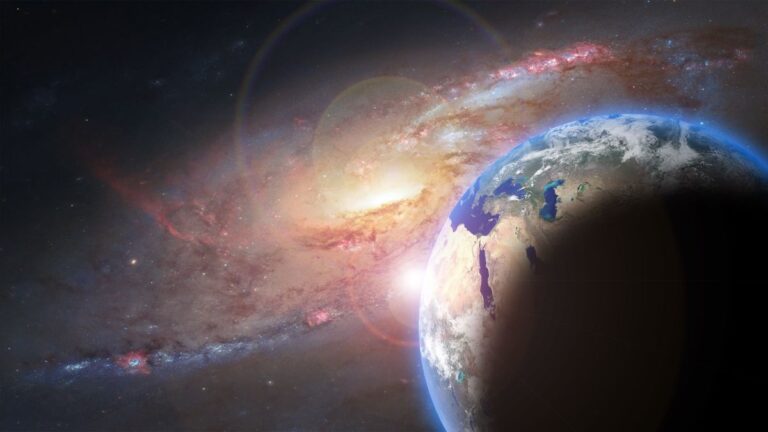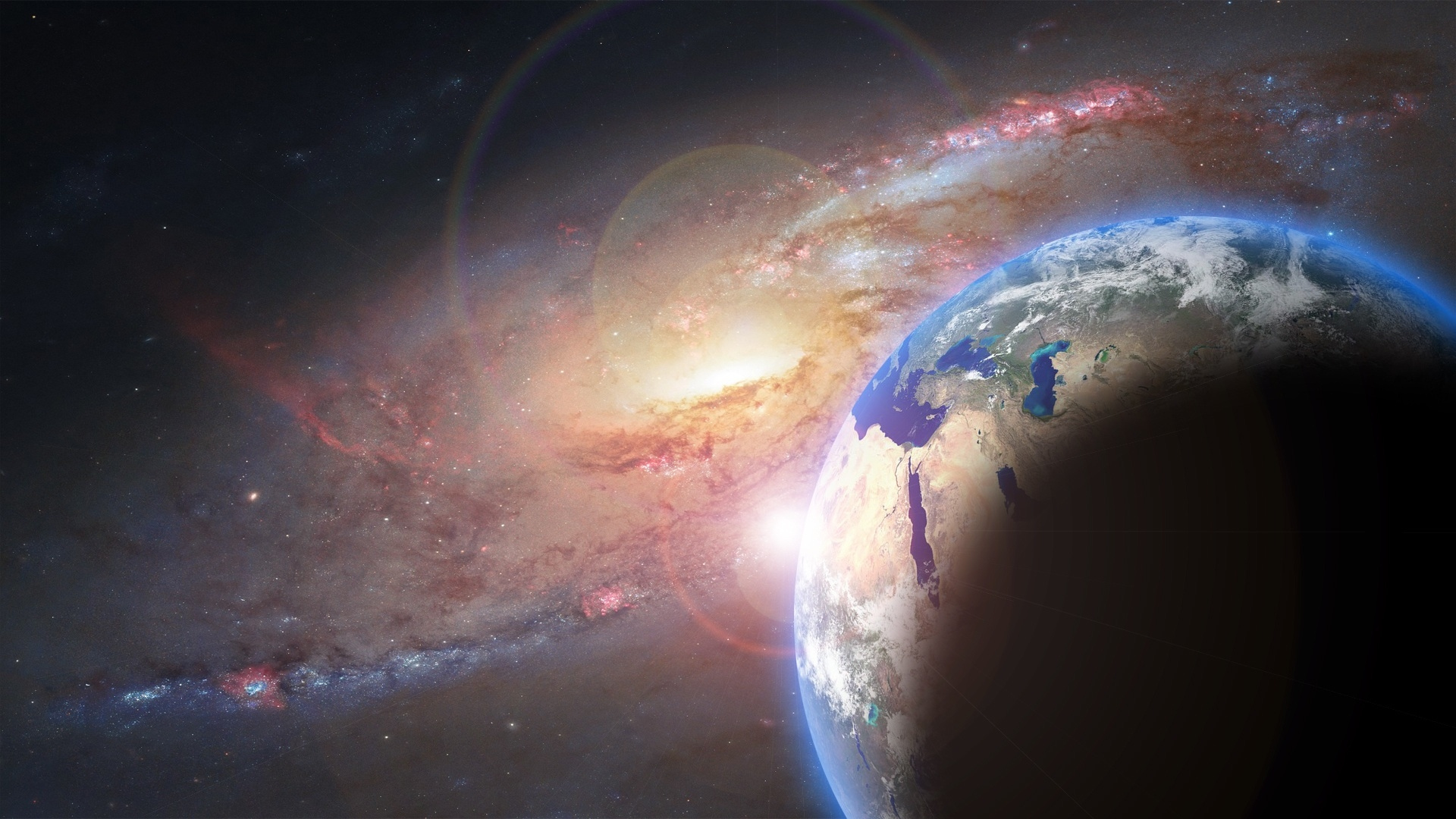
[ad_1]

In Liu Cixin’s brief story “The Wandering Earth (opens in new tab)” (first revealed in Chinese language journal Science Fiction World in July 2000), Cixin portrays a state of affairs through which the planet’s leaders comply with propel Earth out of the photo voltaic system to flee an imminent photo voltaic flare that’s anticipated to decimate all the terrestrial planets.
This story is, in fact, primarily based within the realm of fiction, however might Earth ever actually depart the photo voltaic system?
“It is impossible,” Matteo Ceriotti, an aerospace engineer and house methods engineering lecturer on the College of Glasgow within the U.Okay., instructed Reside Science in an e-mail.
Nonetheless, as Ceriotti defined, “unlikely” doesn’t imply it is “inconceivable,” and advised a means it might theoretically be performed.
“The Earth might be moved away from its orbit by means of the motion of a large interstellar object, flying by means of interstellar house and coming into the photo voltaic system and passing near the Earth,” he mentioned.
Associated: What if Earth have been a super-Earth? (opens in new tab)
“On this shut encounter, often known as a ‘flyby,’ the Earth and the thing would alternate power and momentum, and the Earth’s orbit can be disrupted. If the thing have been quick, huge and shut sufficient, it might venture the Earth into an escape orbit directed outdoors of the photo voltaic system.”
Timothy Davis, a senior lecturer in physics and astronomy at Cardiff College within the U.Okay., agreed that Earth might theoretically be ousted from the photo voltaic system, and has his personal speculation about how this might occur.
“The planets, as they exist proper now, are in secure orbits across the solar. Nonetheless, if the solar have been to have a detailed encounter with one other star, then the gravitational interactions of those our bodies might disturb these orbits, and probably trigger Earth to be ejected from the photo voltaic system,” Davis instructed Reside Science in an e-mail.
Nonetheless, Davis famous that, whereas this state of affairs is possible, it’s extremely uncertain it is going to occur — not less than, within the foreseeable future.
“Such stellar encounters are fairly uncommon,” Davis mentioned. “As an illustration, we all know that the star Gliese 710 is predicted to come back fairly shut, in astronomical phrases, to the solar in round one million years’ time — however even this flyby is unlikely to perturb the planets.”
Whereas it is inconceivable that exterior forces will power Earth out of the photo voltaic system any time quickly, might humanity construct equipment able to shifting the planet to such a level that it finally ends up being ejected?
“The power required to take away the Earth from its orbit and eject it from the photo voltaic system is so huge — equal to sextillion (a 1 with 21 zeros after it) megaton nuclear bombs going off without delay — that this appears unlikely,” Davis mentioned.
Associated: Why is not Earth completely spherical?
Though such an occasion is much from possible, what would occur if Earth have been to interrupt away from the photo voltaic system? What impacts would happen if our house planet ended up being completely booted into the depths of the universe?
“Earth would fly into interstellar house till captured or swallowed by one other star or a black gap,” Ceriotti mentioned, including that have been Earth to go away the photo voltaic system, it could most likely end result within the decimation of a lot — if not all — of the planet’s life.
“It is unlikely that the ambiance would stay: Earth’s world local weather could be very delicate on account of a high quality stability of radiation incoming from the solar and power dissipated to deep house. If this was to range, temperatures would instantly and dramatically change,” Ceriotti mentioned.
Davis agreed that almost all life on Earth wouldn’t survive this cataclysmic transfer away from the photo voltaic system.
“If Earth have been to go away the photo voltaic system, it’s totally seemingly that the overwhelming majority of life as we all know it could disappear. Virtually all of the power utilized by Earth’s dwelling organisms originates from the solar, both instantly (e.g. vegetation that photosynthesize (opens in new tab)), or not directly (e.g. herbivores consuming the vegetation, and carnivores consuming the herbivores).
“On this state of affairs, the additional Earth moved away from the solar, the decrease its temperature (opens in new tab) would change into. It will finally freeze over completely. The one pure supply of warmth left can be the decay of radioactive parts within the Earth’s crust left over from the formation of the photo voltaic system,” Davis mentioned.
Davis defined that some life could linger however would finally be doomed. “Some ‘extremophiles’ (animals/vegetation that may reside in excessive environments) may eke out a dwelling from this power, however advanced life would seemingly disappear completely. This radioactive warmth would solely enable the Earth to take care of a temperature of round minus 230 levels C [Celsius, or minus 382 degrees Fahrenheit]. At these temperatures many of the ambiance would additionally freeze out, leaving Earth as a lifeless, icy world hurtling between the celebrities,” Davis mentioned.
Trying far into the longer term, Ceriotti added that our photo voltaic system will finally be disturbed so severely that Earth will both be knocked out of it, or shall be destroyed completely.
“We predict that our galaxy is on target to collide with Andromeda [our nearest neighboring galaxy] in roughly 4.5 billion years. Such a large-scale collision of hundreds of thousands of stars is prone to trigger a serious disruption within the photo voltaic system!” Ceriotti mentioned. “It is usually foreseen that the solar will, within the subsequent 5 billion years or so, enlarge and engulf the Earth,” Ceriotti added
So, whereas Earth will finally depart the photo voltaic system a method or one other, it isn’t one thing we must fear about for a couple of billion years but. In all probability.
Initially revealed on Reside Science.
[ad_2]